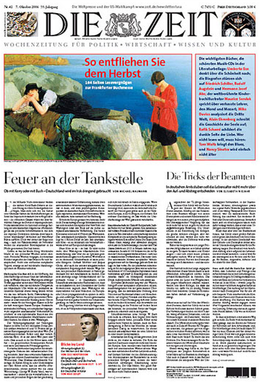Die Zeit
Die Zeit is a German national weekly newspaper known for its distinctive journalistic quality, in-depth analysis, and comprehensive coverage of a wide range of topics including politics, economy, culture, science, and education. Founded in 1946, it has established itself as one of the leading newspapers in the German language media landscape. Die Zeit is headquartered in Hamburg, Germany, but it has a significant presence both nationally and internationally through its online edition.
History[edit | edit source]
Die Zeit was established shortly after World War II, on February 21, 1946, by Count Richard von Coudenhove-Kalergi, British journalist Lothar Ruebelt, and the former chancellor of Hamburg, Max Brauer. Its founding principle was to provide a platform for independent, liberal journalism in a country that was rebuilding its democratic institutions. Over the decades, Die Zeit has maintained its commitment to thorough, well-researched journalism, often providing space for opposing viewpoints and detailed analysis of current events and issues.
Editorial Profile[edit | edit source]
The newspaper is known for its distinctive format, which includes lengthy articles, essays, and commentaries, allowing for a deeper exploration of topics than is typical in daily newspapers. Die Zeit's editorial stance is generally considered centrist to liberal, with a strong emphasis on promoting democracy, human rights, and social justice.
Die Zeit publishes a variety of supplements, including Zeit Magazin, a weekly magazine featuring articles on lifestyle, culture, and society, and Zeit Wissen, a bimonthly magazine focused on science and education. Additionally, special editions and supplements cover topics such as literature, travel, and career guidance.
Circulation and Readership[edit | edit source]
With a weekly circulation of over 500,000 copies, Die Zeit reaches a broad audience in Germany and abroad. Its readers are typically well-educated, affluent individuals who value in-depth analysis and comprehensive reporting on national and international affairs. The newspaper's online presence has expanded its reach, attracting millions of visitors to its website each month.
Impact and Controversies[edit | edit source]
Die Zeit has played a significant role in shaping public discourse in Germany and beyond. Its investigative journalism has brought to light important issues and influenced political and social debates. However, like any major media outlet, it has also faced criticism and controversy, particularly regarding its editorial choices and the portrayal of sensitive topics.
Conclusion[edit | edit source]
As a bastion of quality journalism, Die Zeit continues to uphold its tradition of providing insightful, well-researched content. Its commitment to in-depth reporting and balanced analysis makes it an essential read for those seeking to understand the complexities of contemporary issues from a German perspective.
Navigation: Wellness - Encyclopedia - Health topics - Disease Index - Drugs - World Directory - Gray's Anatomy - Keto diet - Recipes
Search WikiMD
Ad.Tired of being Overweight? Try W8MD's physician weight loss program.
Semaglutide (Ozempic / Wegovy and Tirzepatide (Mounjaro / Zepbound) available.
Advertise on WikiMD
WikiMD is not a substitute for professional medical advice. See full disclaimer.
Credits:Most images are courtesy of Wikimedia commons, and templates Wikipedia, licensed under CC BY SA or similar.Contributors: Prab R. Tumpati, MD





